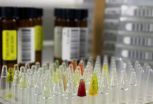(Press-News.org) West Orange, NJ. September 5, 2012. Kessler Foundation has released preliminary research findings from its clinical study of the wearable robotic exoskeletal device, Ekso (Ekso Bionics). Gail Forrest, PhD, assistant director of Human Performance and Engineering Research, presented the Ekso research data on September 3, at the meeting of the Academy of Spinal Cord Injury Professionals at the Rio Suites in Las Vegas. Dr. Forrest directs mobility research at the Foundation, including activity-based locomotor therapy, functional electrical stimulation, and treadmill training with the LokomatPro v6, as well as Ekso. Her research focuses on new ways to improve function and restore mobility for people with disabilities and reduce their long-term risks for complications.
Ekso, has been undergoing clinical investigation in patients with spinal cord injury at Kessler since October 2011, when the research team received the second commercial unit distributed by Ekso Bionics. "Our initial research results are promising for the potential application of Ekso-assisted walking in rehabilitation, in exercise/wellness programs, in the community and for home use," said Dr. Forrest.
Dr. Forrest not only studies the mechanics of how people with paralysis stand and walk in Ekso, she looks at the impact of these activities on their muscles, hearts and lungs. Long-term studies are needed to evaluate the effects on common secondary complications such as cardiovascular disease, loss of bone and muscle, pressure ulcers, depression, chronic pain, and loss of bladder/bowel control.
Dr. Forrest reported on data collected in 13 patients (12 with paraplegia and 1 with tetraplegia) with spinal cord injury (complete and incomplete injuries) enrolled in the Ekso study. Thus far, walking and standing with Ekso is feasible for people with a range of spinal cord disorders that cause paraplegia. Individuals with higher levels of spinal cord injury may also benefit, but require more time to learn Ekso-assisted walking.
Gait and balance data indicate positive results/progress, ie, for individuals engaging in Ekso-assisted training sessions, walking speed and distance, fluidity, gait and balance improve with training on the exoskeleton. Metabolic and cardiovascular responses were evidenced by increases in oxygen consumption, ventilation and heart rate. These increases occurred with changes from resting to standing position and increased further with changes from standing to walking. Dr. Forrest confirmed this effect by comparing the responses of a patient skilled at Ekso-assisted walking (30 sessions of training) with those of a novice walker. Oxygen consumption returned to baseline much faster in the skilled walker, indicating a training effect. "These are only preliminary data," emphasized Dr. Forrest. "The mechanisms underlying these responses need further investigation. These findings are indicative of potential benefits for the heart, lungs, and the circulation, an important finding in this high-risk population."
Another interesting finding was increased muscle firing in the lower leg muscles during Ekso-assisted walking. More detailed research is needed to evaluate the potential health benefits of this muscle activity, according to Dr. Forrest.
Advances in engineering are enabling advances in Ekso research. Auto-control for greater flexibility and maximal independence is a new feature in the upgraded device, Ekso 1.1, being tested at Kessler Foundation. Data collection is now automated, which will aid the expansion of Ekso's capabilities in the future.
###
About Gail Forrest, PhD
At Kessler Foundation, Dr. Forrest is assistant director of Human Performance & Engineering Research, which is headed by Guang Yue, PhD. Dr. Forrest is also the director of the Kessler NeuroRecovery Network site, a multicenter project of the Reeve Foundation that studies the effect of intensive repetitive locomotor training on mobility in individuals with spinal cord injuries. She also holds a faculty appointment at the department of physical medicine & rehabilitation at the University of Medicine & Dentistry-New Jersey Medical School in Newark, New Jersey.
About Kessler Foundation
Kessler Foundation is one of the largest public charities in the field of disability. Kessler Foundation Research Center focuses on improving function and quality of life for persons with injuries of the spinal cord and brain, stroke, multiple sclerosis, and other chronic neurological conditions. Kessler Foundation Program Center fosters new approaches to the persistently high rates of unemployment among people disabled by injury or disease. Targeted grantmaking funds promising programs across the nation. Veterans of Iraq and Afghanistan, people recovering from catastrophic injuries and stroke, and young adults striving for independence are among the thousands of people finding jobs and training for careers as a result of the commitment of Kessler Foundation.
Find us at KesslerFoundation.org
Like us at http://www.facebook.com/KesslerFoundation
Follow us @KesslerFound http://twitter.com/#!/KesslerFound
Carolann Murphy, PA 973-324-8382, Cmurphy@KesslerFoundation.org
Lauren Scrivo, 973-324-8384, 973-768-6583 (cell), LScrivo@KesslerFoundation.org
END
Research from Karolinska Institutet in Sweden shows that sorafenib, a drug used for advanced cancer of the kidneys and liver, could also be effective against multiple myeloma. The disease is one of the more common forms of blood cancer and is generally incurable.
"Recently developed drugs, like bortezomib, have increased the survival rate for people with this serious and complex disease," says study leader Theocharis Panaretakis, docent of experimental oncology. "Having said this, the heterogeneity of the disease progression, the treatment response and the development ...
It has long been believed that drinking green tea is good for the memory. Now researchers have discovered how the chemical properties of China's favorite drink affect the generation of brain cells, providing benefits for memory and spatial learning. The research is published in Molecular Nutrition & Food Research.
"Green tea is a popular beverage across the world," said Professor Yun Bai from the Third Military Medical University, Chongqing, China. "There has been plenty of scientific attention on its use in helping prevent cardiovascular diseases, but now there is emerging ...
New Rochelle, NY, September 5, 2012—According to the Centers for Disease Control and Prevention (CDC), 1 in 88 children in the U.S. has autism spectrum disorder (ASD), a broad group of neurodevelopmental disorders. Children and adolescents with ASD are typically fascinated by screen-based technology such as videogames and these can be used for educational and treatment purposes as described in an insightful Roundtable Discussion published in Games for Health Journal: Research Development, and Clinical Applications, a peer-reviewed publication from Mary Ann Liebert, Inc.. ...
Climate change, pollution, the extraction of water for irrigation and overfishing all threaten the survival of the common trout. This fish is very sensitive to changes in its environment and, according to the Spanish study, its habitat will have reduced by half by the year 2040 and will have completely disappeared from Iberian rivers by 2100, so its population will become extinct.
Global warming is threatening the existence of many fish species, especially those in the salmonid family, which are sensitive to temperature changes as they require clear and fresh water to ...
ROCHESTER, Minn. -- Rheumatoid arthritis alone is painful and disabling, but it also puts patients at higher risk of death. The greater susceptibility to infections that accompanies the autoimmune disorder is one reason. Assessing the danger of infection a particular patient faces so it can be addressed can prove challenging for physicians. A Mayo Clinic study finds that a risk score can be developed to predict a patient's chances of having serious infections. The score uses information about how rheumatoid arthritis is affecting a patient, plus factors including age, corticosteroid ...
This press release is available in German.
In about half of all prostate tumours, there are two genetic areas that are fused with one another. When this is not the case, the exact way cancer cells originate in prostate tumours was not clear until now. Scientists at the Max Planck Institute for Molecular Genetics in Berlin, in cooperation with a team of international researchers, were able to show that the genesis of this fusion-negative prostate cancer has epigenetic causes: methyl groups are distributed differently over the DNA in the cancer cells than in healthy cells. ...
Medical Systems Virology group at the Institute for Molecular Medicine Finland (FIMM) at the University of Helsinki, together with its national and international collaborators, developed a new cell screening method that can be used to identify potential anti-influenza drugs. The researchers were able to identify two novel compounds with anti-influenza activity, obatoclax and gemcitabine and prove the efficacy of a previously known drug saliphenylhalamide.
The study was recently accepted for publication in the Journal of Biological Chemistry and is now available online.
Influenza ...
Like all sources of information, DNA sequences come in various degrees of quality and reliability. To identify, proof, and discard compromised molecular data has thus become a critical component of the scientific endeavor - one that everyone generating sequence data is assumed to carry out before using the sequences for research purposes.
"Many researchers find sequence quality control difficult, though", says Dr. Henrik Nilsson of the University of Gothenburg and the lead author of a new article on sequence reliability, published in the Open Access journal MycoKeys. ...
Archaeologists from the University of Leicester who are leading the search for King Richard III have announced they have overcome the first significant hurdle of their investigation – and made a huge step forward in the search for the King by locating the church where he was buried.
The University of Leicester is leading the archaeological search for the burial place of King Richard III with Leicester City Council, in association with the Richard III Society.
In 1485 King Richard III was defeated at the battle of Bosworth. His body, stripped and despoiled, was brought ...
WOMEN having surgery for breast cancer are up to three times more likely to have severe pain in the first week after surgery if they suffer from other painful conditions, such as arthritis, low back pain and migraine, according to a Cancer Research UK study published today (Wednesday) in the British Journal of Cancer.
Of the women surveyed, 41 per cent reported moderate to severe pain at rest, and 50 per cent on movement, one week after their surgery. Most patients having breast cancer surgery are discharged home by this time.
Psychological state was also important, ...




